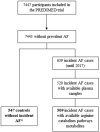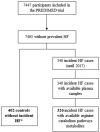Arginine catabolism metabolites and atrial fibrillation or heart failure risk: 2 case-control studies within the Prevención con Dieta Mediterránea (PREDIMED) trial
- PMID: 35575609
- PMCID: PMC9437981
- DOI: 10.1093/ajcn/nqac139
Arginine catabolism metabolites and atrial fibrillation or heart failure risk: 2 case-control studies within the Prevención con Dieta Mediterránea (PREDIMED) trial
Abstract
Background: Arginine-derived metabolites are involved in oxidative and inflammatory processes related to endothelial functions and cardiovascular risks.
Objectives: We prospectively examined the associations of arginine catabolism metabolites with the risks of atrial fibrillation (AF) or heart failure (HF), and evaluated the potential modifications of these associations through Mediterranean diet (MedDiet) interventions in a large, primary-prevention trial.
Methods: Two nested, matched, case-control studies were designed within the Prevención con Dieta Mediterránea (PREDIMED) trial. We selected 509 incident cases and 547 matched controls for the AF case-control study and 326 cases and 402 matched controls for the HF case-control study using incidence density sampling. Fasting blood samples were collected at baseline and arginine catabolism metabolites were measured using LC-tandem MS. Multivariable conditional logistic regression models were applied to test the associations between the metabolites and incident AF or HF. Interactions between metabolites and intervention groups (MedDiet groups compared with control group) were analyzed with the likelihood ratio test.
Results: Inverse association with incident AF was observed for arginine (OR per 1 SD, 0.83; 95% CI: 0.73-0.94), whereas a positive association was found for N1-acetylspermidine (OR for Q4 compared with Q1 1.58; 95% CI: 1.13-2.25). For HF, inverse associations were found for arginine (OR per 1 SD, 0.82; 95% CI: 0.69-0.97) and homoarginine (OR per 1 SD, 0.81; 95% CI: 0.68-0.96), and positive associations were found for the asymmetric dimethylarginine (ADMA) and symmetric dimethlyarginine (SDMA) ratio (OR per 1 SD, 1.19; 95% CI: 1.02-1.41), N1-acetylspermidine (OR per 1 SD, 1.34; 95% CI: 1.12-1.60), and diacetylspermine (OR per 1 SD, 1.20; 95% CI: 1.02-1.41). In the stratified analysis according to the dietary intervention, the lower HF risk associated with arginine was restricted to participants in the MedDiet groups (P-interaction = 0.044).
Conclusions: Our results suggest that arginine catabolism metabolites could be involved in AF and HF. Interventions with the MedDiet may contribute to strengthen the inverse association between arginine and the risk of HF. This trial was registered at controlled-trials.com as ISRCTN35739639.
Keywords: Mediterranean diet; arginine catabolism metabolites; atrial fibrillation; case-control; heart failure; metabolomics.
© The Author(s) 2022. Published by Oxford University Press on behalf of the American Society for Nutrition.
Figures



Similar articles
-
Metabolomics of the tryptophan-kynurenine degradation pathway and risk of atrial fibrillation and heart failure: potential modification effect of Mediterranean diet.Am J Clin Nutr. 2021 Nov 8;114(5):1646-1654. doi: 10.1093/ajcn/nqab238. Am J Clin Nutr. 2021. PMID: 34291275 Free PMC article. Clinical Trial.
-
Plasma acylcarnitines and risk of incident heart failure and atrial fibrillation: the Prevención con dieta mediterránea study.Rev Esp Cardiol (Engl Ed). 2022 Aug;75(8):649-658. doi: 10.1016/j.rec.2021.10.005. Epub 2021 Dec 2. Rev Esp Cardiol (Engl Ed). 2022. PMID: 34866031 Free PMC article. Clinical Trial.
-
High Plasma Glutamate and a Low Glutamine-to-Glutamate Ratio Are Associated with Increased Risk of Heart Failure but Not Atrial Fibrillation in the Prevención con Dieta Mediterránea (PREDIMED) Study.J Nutr. 2020 Nov 19;150(11):2882-2889. doi: 10.1093/jn/nxaa273. J Nutr. 2020. PMID: 32939552 Free PMC article.
-
Benefits of the Mediterranean Diet: Insights From the PREDIMED Study.Prog Cardiovasc Dis. 2015 Jul-Aug;58(1):50-60. doi: 10.1016/j.pcad.2015.04.003. Epub 2015 May 1. Prog Cardiovasc Dis. 2015. PMID: 25940230 Review.
-
The Mediterranean Diet and Cardiovascular Health.Circ Res. 2019 Mar;124(5):779-798. doi: 10.1161/CIRCRESAHA.118.313348. Circ Res. 2019. PMID: 30817261 Review.
Cited by
-
Recent advances in precision nutrition and cardiometabolic diseases.Rev Esp Cardiol (Engl Ed). 2025 Mar;78(3):263-271. doi: 10.1016/j.rec.2024.09.003. Epub 2024 Sep 30. Rev Esp Cardiol (Engl Ed). 2025. PMID: 39357800 Free PMC article. Review.
-
Biomarkers of Atrial Fibrillation Recurrence in Patients with Paroxysmal or Persistent Atrial Fibrillation Following External Direct Current Electrical Cardioversion.Biomedicines. 2023 May 16;11(5):1452. doi: 10.3390/biomedicines11051452. Biomedicines. 2023. PMID: 37239123 Free PMC article. Review.
-
A multi-metabolite signature robustly predicts long-term mortality in the PREDIMED trial and several US cohorts.Metabolism. 2025 Sep;170:156195. doi: 10.1016/j.metabol.2025.156195. Epub 2025 Mar 17. Metabolism. 2025. PMID: 40107652 Free PMC article. Clinical Trial.
-
Metabolomics in Atrial Fibrillation: Unlocking Novel Biomarkers and Pathways for Diagnosis, Prognosis, and Personalized Treatment.J Clin Med. 2024 Dec 25;14(1):34. doi: 10.3390/jcm14010034. J Clin Med. 2024. PMID: 39797116 Free PMC article. Review.
-
Protein-Energy Malnutrition Is Associated with Worse Outcomes in Patients with Atrial Fibrillation: A Nationwide Analysis.J Innov Card Rhythm Manag. 2023 Aug 15;14(8):5538-5545. doi: 10.19102/icrm.2023.14082. eCollection 2023 Aug. J Innov Card Rhythm Manag. 2023. PMID: 37650124 Free PMC article.
References
-
- Cook C, Cole G, Asaria P, Jabbour R, Francis DP.. The annual global economic burden of heart failure. Int J Cardiol. 2014;171(3):368–76. - PubMed
-
- Karnik AA, Gopal DM, Ko D, Benjamin EJ, Helm RH.. Epidemiology of atrial fibrillation and heart failure: a growing and important problem. Cardiol Clin. 2019;37(2):119–29. - PubMed
-
- Ussher JR, Elmariah S, Gerszten RE, Dyck JRB.. The emerging role of metabolomics in the diagnosis and prognosis of cardiovascular disease. J Am Coll Cardiol. 2016;68(25):2850–70. - PubMed
-
- Morris SM. Arginine metabolism revisited. J Nutr. 2016;146(12):2579S–86S. - PubMed
Publication types
MeSH terms
Substances
Grants and funding
LinkOut - more resources
Full Text Sources
Medical
Research Materials
Miscellaneous

